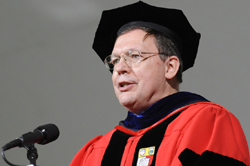
INAUGURATION
Greeting from the Faculty
 Richard G. French, professor and department chair
Richard G. French, professor and department chair
Wellesley College Astronomy Department
May 9, 2008
President Bottomly, it is an honor for me to greet you on behalf of the faculty of Wellesley College. Artists and athletes, musicians and poets, scientists and philosophers, linguists and historians, instructors and deans, we are more than 300 strong. Our personal journeys have brought us to this place from across the country and around the world for a common purpose: to bring out the best in our students, to share our knowledge and love of learning with them, and to challenge them each day to see the universe with new eyes, alive with possibilities. At our best, we challenge each other and ourselves as well, and recognize, with James Thurber, that it is better to ask some of the questions than to know all of the answers. When we forget this, and think we know it all, we can usually count on our students to bring us back to earth!
We know, from your own scientific work and your engagement with our diverse community, that you share this willingness to challenge and to question beliefs well established. The most profound revolutions in science have often come from those who have made us most uncomfortable, and arguably it was Copernicus, nearly 500 years ago, who provoked our greatest discomfort by displacing the earth from the center of the universe and claiming that we were just the third rock from the sun. I am delighted to announce that Wellesley College has acquired an edition of Copernicus's masterwork, "On the revolutions of the celestial bodies," which I share with you now, in celebration of this day and in a spirit of revolution.
Copernicus saw the world anew, and forced us to imagine, contrary to common sense, that at this moment we are spinning at a thousand miles an hour on a globe that is whirling around the sun at twenty miles a second. Yet, his great work nearly died with him, unpublished. In 1539, a young mathematician by the name of Georg Rheticus traveled to Poland to visit Copernicus, and to learn about his revolutionary ideas at first hand. He lived with the great man for two years, urged him to write, and drew forth from Copernicus his greatest work for the world to see. As one historian put it, "No Rheticus, no Copernicus."
President Bottomly, may you follow in the footsteps of the youthful Rheticus, and help us to be revolutionaries as well. We, the faculty of Wellesley College, are ready to do our greatest work, and we look forward to this grand, new adventure together. Let the revolution begin!